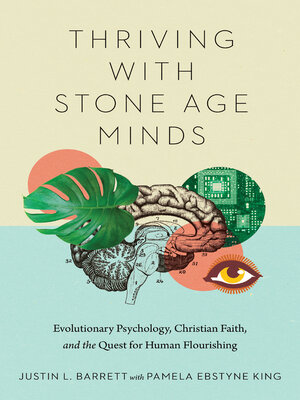Thriving with Stone Age Minds: Evolutionary Psychology, Christian Faith, and the Quest for Human Flourishing
ebook ∣ BioLogos Books on Science and Christianity
By Justin L. Barrett

Sign up to save your library
With an OverDrive account, you can save your favorite libraries for at-a-glance information about availability. Find out more about OverDrive accounts.
Find this title in Libby, the library reading app by OverDrive.



Search for a digital library with this title
Title found at these libraries:
| Library Name | Distance |
|---|---|
| Loading... |
What does God's creation of humanity through the process of evolution mean for human flourishing? The emerging field of evolutionary psychology remains controversial, perhaps especially among Christians. Yet according to Justin Barrett and Pamela Ebstyne King it can be a powerful tool for understanding human nature and our distinctively human purpose.
Thriving with Stone Age Minds provides an introduction to evolutionary psychology, explaining key concepts like hyper-sociality, information gathering, and self-control. Combining insights from evolutionary psychology with resources from the Bible and Christian theology, Barrett and King focus fresh attention on the question, What is human flourishing? When we understand how humans still bear the marks of our evolutionary past, new light shines on some of the most puzzling features of our minds, relationships, and behaviors.
One key insight of evolutionary psychology is how humans both adapt to and then alter our environments, or "niches." In fact, we change our world faster than our minds can adapt—and then gaps in our "fitness" emerge. In effect, humans are now attempting to thrive in modern contexts with Stone Age minds. By integrating scientific evidence with wisdom from theological anthropology, we can learn to close up nature-niche gaps and thrive, becoming more what God has created us to be.
BioLogos Books on Science and Christianity invite us to see the harmony between the sciences and biblical faith on issues including cosmology, biology, paleontology, evolution, human origins, the environment, and more.







